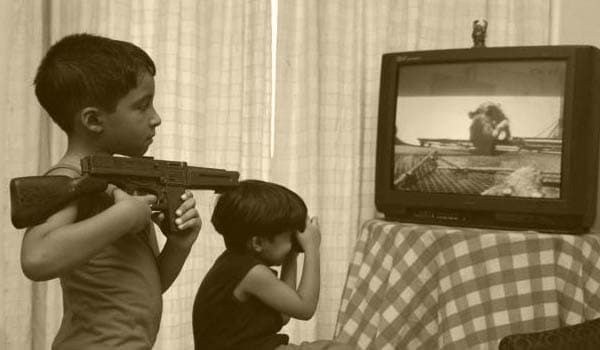Connections:
To Real Life
It is hard for me to make a real life connection between Ishmael Beah's story, or the article and my own life, as i myself have played violent and do not feel any desire to go into war killing people. I have, however, witnessed many boys who start playing such violent games at a very young age and these boys become evidently far more aggressive compared to other children. Perhaps video games do cause effects on the minds of the youth and we should stop using the stereotypical excuse that all boys will be violent.
To the Article
A similar concern i discovered in both the article and the interview is how easily children adapt to their surroundings. Ishmael Beah spoke about how "constantly witnessing this violence" makes one feel more accustomed to the setting of war (guns, blood, death, etc.). However, one does not have to actually experience war with their own eyes in order to get influenced by it. Teaching Kids to Kill explains how evidence shows that when children are shown fictional violence, whether it be on TV or in video games, they cannot differentiate it from real life.
Another connection I made between the article and the interview is looking at the role of the leading men in the Army. Ishmael Beah talks about the Commanders appearing as "father figures, or brothers" overtime due to the fact that they (the children) had lost everyone and these men seemed to be the only ones protecting them in a way. I think this might be because they told them who the 'enemies' were and exactly who to kill, so they probably got the illusion that the Commanders and other leaders were trustworthy and responsible people. In Teaching Kids to Kill there is a section that speaks about Role Models, which directly relates to how Ishmael describes seeing his Commanders; "In the military your role model is your drill sergeant".
Challenges:
The only thing i would challenge in this video is when Ishmael said he was faced with 2 choices: to kill or to be killed. Of course it is in human nature to want to live and putting your life before anything, fighting for survival. However, being a kid while faced with this decision is a different story. Although he chose the option that let him remain alive (physically speaking), it was the child within that they had killed. They took away his youth and innocence, and stripped him of his childhood. So in spite of the fact that he got to live, he was psychologically affected so greatly that due to these events, he never got to live as a child.
Concepts:
I took away two main ideas which i learned from both the interview and the article.
a) When children are young, they cannot think for themselves so they need people watching out for them constantly. Also, the minds of children grasp onto things quickly, and look at most things in a real life perspective until they mature.
b) The psychological effects of going to war remain with a person for a very long time after the war, sometimes a life time. The psychological effects of those who went to war as children are far worse, and on top of everything else, these victims never get back their childhood.
 Changes:
Changes:
I believe the most common change after reading the article/watching the interview would be the way society looks at video games, television, and all other media. Of course corporations will continue creating these games and there will definitely be many more Hollywood movies filled with gore and violence. Nonetheless, people should look at all these things differently, and with far more consideration, especially parents of younger children. It has been shown beyond doubt that violence effects the minds of younger children the most, and it is the responsibility of the parents/guardians of these children to ensure they are not seeing anything that will make them mentally unstable.











